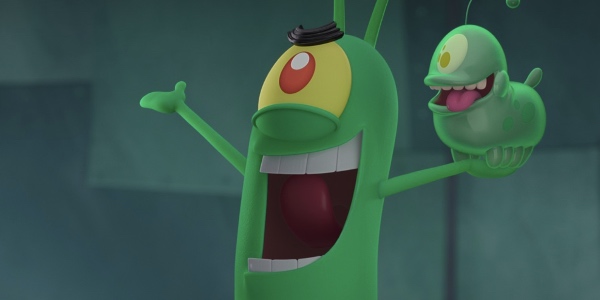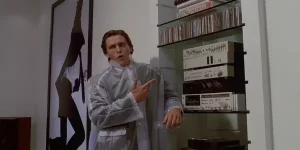
SpongeBob Squarepants (1999-) will forever hold a special place in my heart. Those first three seasons, in particular, captured a perfect balance of child-friendly humor, edginess and surreality. Moreover, the show had a visual style that was all its own. After The SpongeBob Squarepants Movie (2004) was released (which creator Stephen Hillenburg originally intended as the series finale), and Nickelodeon refused to cancel the show, it has since experienced a gradual downward spiral into blandly inoffensive mediocrity. Does Plankton: The Movie (2025), which is now out on Netflix, continue that same disappointing trend?
So What’s The Story?
This time around, failed evil genius Sheldon Plankton (Mr. Lawrence), once again fails to steal the secret formula for the Krabby Patty. As per usual, he casually rejects the advice of his computer wife Karen (Jill Talley). Though now, she’s had enough.
source: Netflix
After she personally removes her empathy chip, Karen transforms herself into a multi-personality cyber-monster, who creates a mothership which plans to take over the world- but with the skill to actually pull it off. Desperate to stop his wife’s evil crusade, Plankton enlists the help of SpongeBob (Tom Kenny), and along the way, may learn a lesson about empathy.
What Works About It (If Anything)?
To say that anything about this movie works would be a gross overstatement. Its story, while well-intentioned, completely misunderstands Plankton as a character. He may have his moments of positive growth, but they’re always self-serving and temporary, eventually giving way to his egotistical lust for power. Plankton’s story- sadly conceived by Mr. Lawrence himself- goes the opposite route, and makes him a flawed protagonist with a heroic arc. On top of that, the creators of this film have misguidedly chosen to make it a musical. I fail to recall the title of any of the seemingly interminable songs, but I was pretty sure I’d been punished for an unknown crime while I watched them.
source: Netflix
The movie also continues its source material’s ongoing and obnoxious descent into inoffensiveness. In a world where films like Puss in Boots: The Last Wish (2022), Flow (2024), and the Inside Out (2015-2024) films exist- pictures which showcase emotionally complex themes, ideas and storylines that both challenge and engage children- Plankton is more the kind of movie you put on to simply keep your kids quiet for ninety minutes while you work on tasks around the house. None of the jokes are willing to test what they can get away with, as if everyone’s feelings need to be coddled. This makes the occasional nod to the 2004 flick, like featuring the Goofy Goober Ice Cream Party Boat, almost feel like a twist of the knife.
That lack of willingness to push boundaries is aided by the computer animation. While the landscaping and character designs are occasionally imaginative, its physical comedy is a failure. Nothing that happens to these characters feels like it really hurts, and none of the destruction that occurs has any actual weight to it. This can also be attributed to the overly-bouncy sound design. The movie seems to have the mentality of those parents who try to shield their kids from anything even mildly objectionable. As a result, it’s innocuously boring, despite everything moving so fast.
Are There Any Saving Graces?
I’ll at least give credit to the voice cast in this. All of the original actors from the show return to their respective roles, and no one slacks off in this. It’s more a matter of not having funny things to say and do. But that’s honestly it, as far as the positives extend. Plankton: The Movie encapsulates a troublesome and growing safeness in kids’ shows that is far better left behind. There’s no attempt to touch on anything insightful, as well as a pitiful timidity in its humor. I think its target audience can handle- nay, deserves- something more. It’s the thematic boldness of films like The Lion King (1994), or Mulan (1998), or the more recent films I mentioned, that both entertain and deepen the thinking of their target demographic. That investigation of more profound ideas through simplistic storytelling is always going to stick with kids the most. This, on the other hand, will never be more than a temporary distraction.
Does content like this matter to you?
Become a Member and support film journalism. Unlock access to all of Film Inquiry`s great articles. Join a community of like-minded readers who are passionate about cinema – get access to our private members Network, give back to independent filmmakers, and more.











